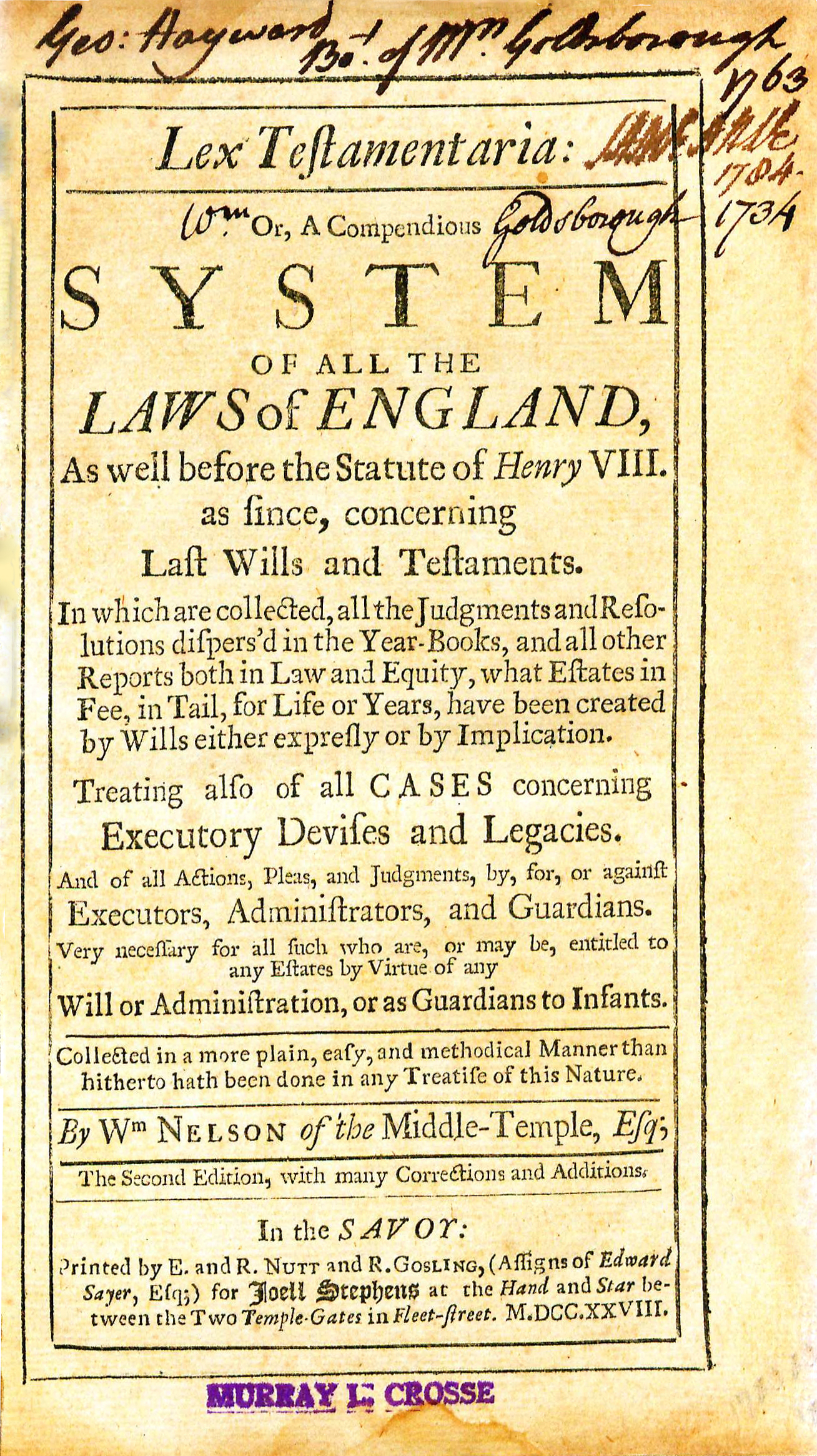Difference between revisions of "Lex Testamentaria"
| Line 1: | Line 1: | ||
| − | {{DISPLAYTITLE:''Lex Testamentaria: or, A Compendious System of All the Laws of England, as Well Before the Statute of Henry VIII. as Since, Concerning Last Wills and Testaments | + | {{DISPLAYTITLE:''Lex Testamentaria: or, A Compendious System of All the Laws of England, as Well Before the Statute of Henry VIII. as Since, Concerning Last Wills and Testaments''}} |
===by William Nelson=== | ===by William Nelson=== | ||
__NOTOC__ | __NOTOC__ | ||
| Line 14: | Line 14: | ||
|pages=[12], 578, [12] | |pages=[12], 578, [12] | ||
|desc=8vo (20 cm.) | |desc=8vo (20 cm.) | ||
| + | |shelf=F-3 | ||
}}William Nelson (b. 1652/3) was admitted to the [http://en.wikipedia.org/wiki/Middle_Temple Middle Temple] in 1673 and called to the bar in 1684. Nelson became a successful practtioner in the Chancery Court and a prolific legal writer, known more for his "considerable legal learning" than his accuracy.<ref> N. G. Jones, [http://www.oxforddnb.com/view/article/19887 "Nelson, William (b. 1652/3)"] ''Oxford Dictionary of National Biography'' (Oxford University Press, 2004- ), accessed November 11, 2013.</ref> His numerous works include ''Office and Authority of a Justice of the Peace'' (1704), ''Rights of the Clergy of Great Britain'' (1709), ''Lex Testamentaria'' (1714), ''Law of Evidence'' and ''Reports of Special Cases in the Court of Chancery'' (1717), and a three-volume ''Abridgment of the Common Law'' (1725/26).<br /> | }}William Nelson (b. 1652/3) was admitted to the [http://en.wikipedia.org/wiki/Middle_Temple Middle Temple] in 1673 and called to the bar in 1684. Nelson became a successful practtioner in the Chancery Court and a prolific legal writer, known more for his "considerable legal learning" than his accuracy.<ref> N. G. Jones, [http://www.oxforddnb.com/view/article/19887 "Nelson, William (b. 1652/3)"] ''Oxford Dictionary of National Biography'' (Oxford University Press, 2004- ), accessed November 11, 2013.</ref> His numerous works include ''Office and Authority of a Justice of the Peace'' (1704), ''Rights of the Clergy of Great Britain'' (1709), ''Lex Testamentaria'' (1714), ''Law of Evidence'' and ''Reports of Special Cases in the Court of Chancery'' (1717), and a three-volume ''Abridgment of the Common Law'' (1725/26).<br /> | ||
<br /> | <br /> | ||
| Line 25: | Line 26: | ||
View the record for this book in [https://catalog.swem.wm.edu/law/Record/2949723 William & Mary's online catalog.] | View the record for this book in [https://catalog.swem.wm.edu/law/Record/2949723 William & Mary's online catalog.] | ||
| + | |||
| + | ==See also== | ||
| + | *[[George Wythe Room]] | ||
| + | *[[Wythe's Library]] | ||
| + | |||
==References== | ==References== | ||
<references/> | <references/> | ||
Revision as of 22:26, 6 July 2015
by William Nelson
| Lex Testamentaria | |
|
Title page from Lex Testamentaria, George Wythe Collection, Wolf Law Library, College of William & Mary. | |
| Author | William Nelson |
| Published | London, In the Savoy: Printed by E. and R. Gosling for Joell Stephens |
| Date | 1728 |
| Edition | Second, with many corrections and additions |
| Language | English |
| Pages | [12], 578, [12] |
| Desc. | 8vo (20 cm.) |
| Location | Shelf F-3 |
William Nelson (b. 1652/3) was admitted to the Middle Temple in 1673 and called to the bar in 1684. Nelson became a successful practtioner in the Chancery Court and a prolific legal writer, known more for his "considerable legal learning" than his accuracy.[1] His numerous works include Office and Authority of a Justice of the Peace (1704), Rights of the Clergy of Great Britain (1709), Lex Testamentaria (1714), Law of Evidence and Reports of Special Cases in the Court of Chancery (1717), and a three-volume Abridgment of the Common Law (1725/26).
Lex Testamentaria: or, A Compendious System of All the Laws of England was among the first texts on English laws of evidence pertaining to probate. Unfortunately, it "digested the cases without attempting to extract underlying principles."[2] Nevertheless, it was republished twice, in 1724 and 1728, both "second" editions.[3]
Evidence for Inclusion in Wythe's Library
Listed in the Jefferson Inventory of Wythe's Library as Nelson’s letters testamentary. 8vo. This was one of the titles kept by Thomas Jefferson. Jefferson may have sold it the Library of Congress in 1815. Both George Wythe's Library[4] on LibraryThing and the Brown Bibliography[5] list the 1728 edition published in London based on the Jefferson copy at the Library of Congress.[6] While the copy still exists, it includes no definitive ties to Wythe. It does include the signature "Tho. Juckes" on the title page. The Wolf Law Library followed the suggestions of Brown and LibraryThing and purchased a copy of the 1728 edition.
Description of the Wolf Law Library's copy
Bound in contemporary calf with blind frames to boards, rebacked retaining spines with raised bands and lettering pieces. Title page signed "Geo: Hayward, Bot. of Wm. Goldsborough 1763," "Wm. Goldsborough 1734" and "<illegible> 1704." Purchased from The Lawbook Exchange, Ltd.
View the record for this book in William & Mary's online catalog.
See also
References
- ↑ N. G. Jones, "Nelson, William (b. 1652/3)" Oxford Dictionary of National Biography (Oxford University Press, 2004- ), accessed November 11, 2013.
- ↑ Ibid.
- ↑ Leslie F. Maxwell, A Bibliography of English Law from 1651 to 1800 (Sweet & Maxwell's Complete Law Book Catalogue, v.2) (London: Sweet & Maxwell, Limited, 1931), 159.
- ↑ LibraryThing, s. v. "Member: George Wythe", accessed on November 19, 2013.
- ↑ Bennie Brown, "The Library of George Wythe of Williamsburg and Richmond," (unpublished manuscript, May, 2012) Microsoft Word file. Earlier edition available at: https://digitalarchive.wm.edu/handle/10288/13433
- ↑ E. Millicent Sowerby, Catalogue of the Library of Thomas Jefferson, 2nd ed. (Charlottesville: University Press of Virginia, 1983), 2:382 [no.2152].
